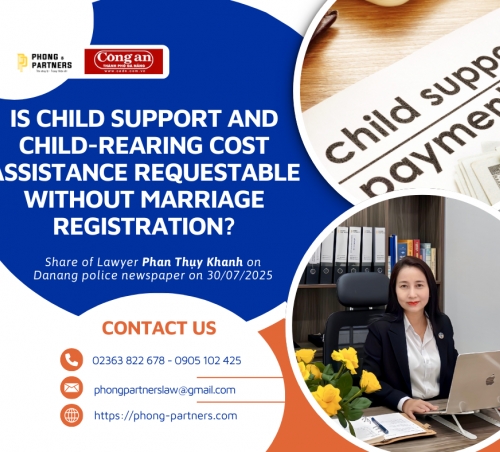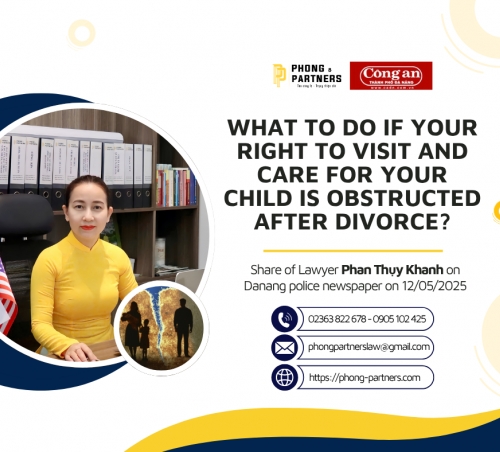.png)
*Lawyer Truong Duc Trung (Head of Quang Nam Branch - Phong & Partners Law Firm) answered:
When a married couple faces frequent conflicts and their relationship is no longer happy, divorce can be a difficult decision, but often the best solution for both parties to end an irreparable relationship and start a new life. In the process of divorce, disputes over child custody and property division often arise. In some cases, the spouses are unable to reach a mutual agreement and have to seek the Court’s intervention.
To protect the rights of both parties in the division of property during divorce, it is essential first to determine whether the property acquired during the marriage is considered joint property or separate property. According to Clause 1, Article 33 of the Law on Marriage and Family 2014, joint property includes:
- Property created by husband and wife’s income from labor, production, and business activities, yields or profits arising from separate property, and other lawful incomes during the marriage, unless otherwise prescribed in Clause 1, Article 40 of the Law on Marriage and Family 2014.
- Property jointly inherited or gifted to both spouses, and other property mutual agreed to be joint property.
- The land use rights obtained by either spouse after marriage shall be joint property of husband and wife, unless they are separately inherited by, or gifted to a spouse or are obtained through transactions involving separate property.
In addition, the separate property of the spouses includes the property as prescribed in Article 43 of the 2014 Law on Marriage and Family as follows:
“ Article 43. Separate property of husband and wife
1. Separate property of a spouse includes property owned by this person before marriage; property inherited by or given separately to him/her during the marriage period; property divided to him/her under Articles 38,39 and 40 of this Law; property to meet his/her essential needs and other property under his/her ownership as prescribed by law.
2. Property created from separate property of a husband or wife is also property of his/ her own. Yields and profits arising from separate property during the marriage period must comply with Clause 1, Article 33, and Clause 1, Article 40 of this Law.”
In the case of Ms. H., based on the information provided, she received a plot of land by her biological parents during the marriage period, and the the gift was formalized in writing. To determine whether this land is considered joint property or separate property, it is necessary to review the Gift agreement and other relevant documents. The following cases may arise:
Case 1: The Gift agreement clearly states that the land was gifted exclusively to Ms. H. and there is no other agreement between Ms. H. and her husband regarding property, then the land shall be deemed Ms. H.'s separate property. According to Clause 1, Article 43 of the Law on Marriage and Family. Therefore, the principle of settling the property of spouses upon divorce is based on Clause 4, Article 59 of the Law on Marriage and Family 2014:
“Article 59. Principles of settlement of property of husband and wife upon divorce
4. The separate property of a spouse shall be under his/her ownership, except for separate property already merged into joint property in accordance with this Law.
According to the above regulations, if the land that Ms. H. was given by her parents has not been merged into the joint property, it will remain her separate property in the event of a divorce, and her husband will not have the right to request a division of this land. However, if during their marriage, Ms. H. and her husband have contributed financially and through effort to the construction and enhancement of this separate property, these include: building a house, building ancillary works on the land,... then when they divorce, the Court will consider dividing the property appropriate to her husband's contribution to this property.
Case 2: According to Clause 4, Article 59 of the Law on Marriage and Family clearly stipulates: “ The separate property of a spouse shall be under his/her ownership, except for separate property already merged into joint property in accordance with this Law.”. This means that if the Gift agreement clearly indicates that the land was gifted to Ms. H. as her separate property, but she later merged it into the joint property of husband and wife, then it is considered joint property during the marriage. Furthermore, Article 46 of the Law on Marriage and Family 2014 stipulates the following regarding the merger of separate property into joint property:
“1. Separate property of a spouse shall be merged into joint property according to the agreement between the husband and wife.
2. For property merged into joint property whose transactions are required by law to be under a certain form, the merger agreement must ensure that form.
3. Unless otherwise agreed by husband and wife or prescribed by law, obligations related to separate property already merged into joint property shall be settled using joint property.”
Merging separate property into joint property is carried out according to the mutual agreement between the spouses, which must be made in writing and notarized to be legally valid. Once merged, the property will be subject to division between the spouses upon divorcejoint property.
Case 3: If the Gift agreement explicitly states that both Ms. H. and her husband are recipients of the land Gift agreement. According to Clause 1, Article 33 of the Law on Marriage and Family 2014, the above land is considered the joint property of the husband and wife during the marriage. Therefore, according to Clause 2, Article 59 of the Law on Marriage and Family 2014 , the land shall be divided into two upon divorce, specifically as follows:
"Article 59. Principles of settlement of property of husband and wife upon divorce
2. Joint property shall be divided equally, taking into account the following factors:
a/ Circumstances of the family, husband and wife;
b/ Each spouse’s contributions to the creation, maintenance and development of joint property. The housework done in the family by a spouse shall be regarded as income-generating labor;
c/ Protecting the legitimate interests of each spouse in their production, business and career activities to create conditions for them to continue working to generate incomes;
d/ Each spouse’s faults in the infringement of spousal rights and obligations.”
Thus, if the land is determined to be the joint property of Ms. H. and her husband during the marriage, its division upon divorce will generally follow the principle that each party is entitled to 50% of its value. However, during the settlement process, the Court must also consider other factors such as each party’s personal circumstances, their respective contributions, and any faults committed by either spouse;... Therefore, in many cases, the property may be divided unequally, possibly in the ratio of 60:40, 70:30, 80:20,... depending on the specific details of the case.
In addition, according to Clause 3, Article 59 of the Law on Marriage and Family 2014, it is stipulated that: “3. Joint property of husband and wife shall be divided in kind, if impossible to be divided in kind, joint property shall be divided based on its value. The partner who receives the property in kind with a value exceeding their entitled share must compensate the other party for the difference.”
In this case of Ms. H., after the Court considers and decides on the division, if Ms. H. receives the land, she must make a payment to her husband in cash for the value of the share to which he is entitled. Conversely, if her husband receives the land, he must make a payment to Ms. H.
In addition to the above cases of property division upon divorce, the law also allows spouses to reach an agreement regarding property division. Article 7 of Joint Circular 01/2016/TTLT-TANDTC-VKSNDTC-BTP guiding the implementation of the Law on Marriage and Family on the principles of settling property between spouses upon divorce is as follows: “Husband and wife, upon divorce, have the right to mutually agree on all matters, including asset division”. Thus, if Ms. H. and her husband can agree that the land given by her parents is her separate property and her husband does not request its division, then regardless of whether the Gift agreement identifies the land as jointly owned, or whether the Ownership Certificate or Land Use Rights Certificate with the names of both husband and wife, this will still be recognized as Ms. H.'s separate property. To be recognized by law, Ms. H. and her husband need to draw up a written agreement on property, and have it notarized to ensure legal validity and prevent future disputes.
In conclusion, whether the piece of land given to Ms. H. by her parents during the marriage should be divided between her and her husband upon divorce depends on whether the land is considered joint property or separate property, and whether there was any agreement regarding the owned property between the spouses. Therefore, it is necessary to rely on the Gift agreement as well as other relevant documents and evidence to determine the essence of this property. This will help ensure that the division of property during the divorce process is carried out accurately and in accordance with the law, thereby protecting the legitimate rights and interests of both Ms. H. and her husband.















